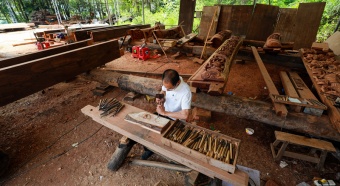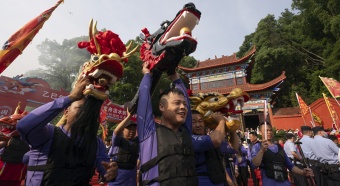
Hua Ni, a 9-year-old female panda and her newborn twin cubs, are seen at the Everland Resort in Yongin, South Korea on Friday. She gave birth to the female twin cubs on Friday. The elder weighed in at 180 grams and the second at 140 grams. CHINA DAILY
Hua Ni, a female panda from the China Conservation and Research Center for the Giant Panda, who currently lives at the Everland Resort in South Korea, gave birth on Friday to a pair of female cubs, the first pair born overseas this year and also the first giant panda twins born in South Korea.
In mid-February, when Hua Ni showed signs of coming into estrus, Chinese and South Korean experts immediately set up an online technical guidance team. Under the careful guidance of the Chinese giant panda center experts, Hua Ni and her mate Yuan Xin were able to mate naturally.
Hua Ni was found to be pregnant in early June. In order to ensure a smooth birth, the Chinese giant panda center immediately sent experts to South Korea to provide on-site guidance on managing the feeding and care of Hua Ni and her cubs.
As a result of the efforts of both sides, Hua Ni gave birth to twins, the first at 4:52 am and the second at 6:39 am on Friday, Seoul time. The elder weighed in at 180 grams and the second at 140 grams.
At present, Hua Ni and her cubs are stable. Expert teams from China and South Korea have worked closely to adjust the postpartum feeding and management plan in real time, in response to the actual condition of both the mother and cubs, continuously monitoring the development of the cubs to guarantee their healthy growth.
In March 2016, the China Wildlife Conservation Association and South Korea's Everland Resort officially launched a giant panda conservation and research cooperation project. The China Conservation and Research Center for the Giant Panda sent two-and-a-half-year-old female Hua Ni and three-and-a-half-year-old male Yuan Xin from Sichuan province to Everland, starting the planned 15-year research project.
The one-year difference between the pair is because male pandas generally enter sexual maturity later than female pandas, and the age difference was meant to ensure the pair entered the reproductive period at the same time and produced offsprings in South Korea.
Thanks to the joint efforts of China and South Korea, the two giant pandas successfully mated and Hua Ni gave birth to their first cub, Fu Bao, in 2020.









